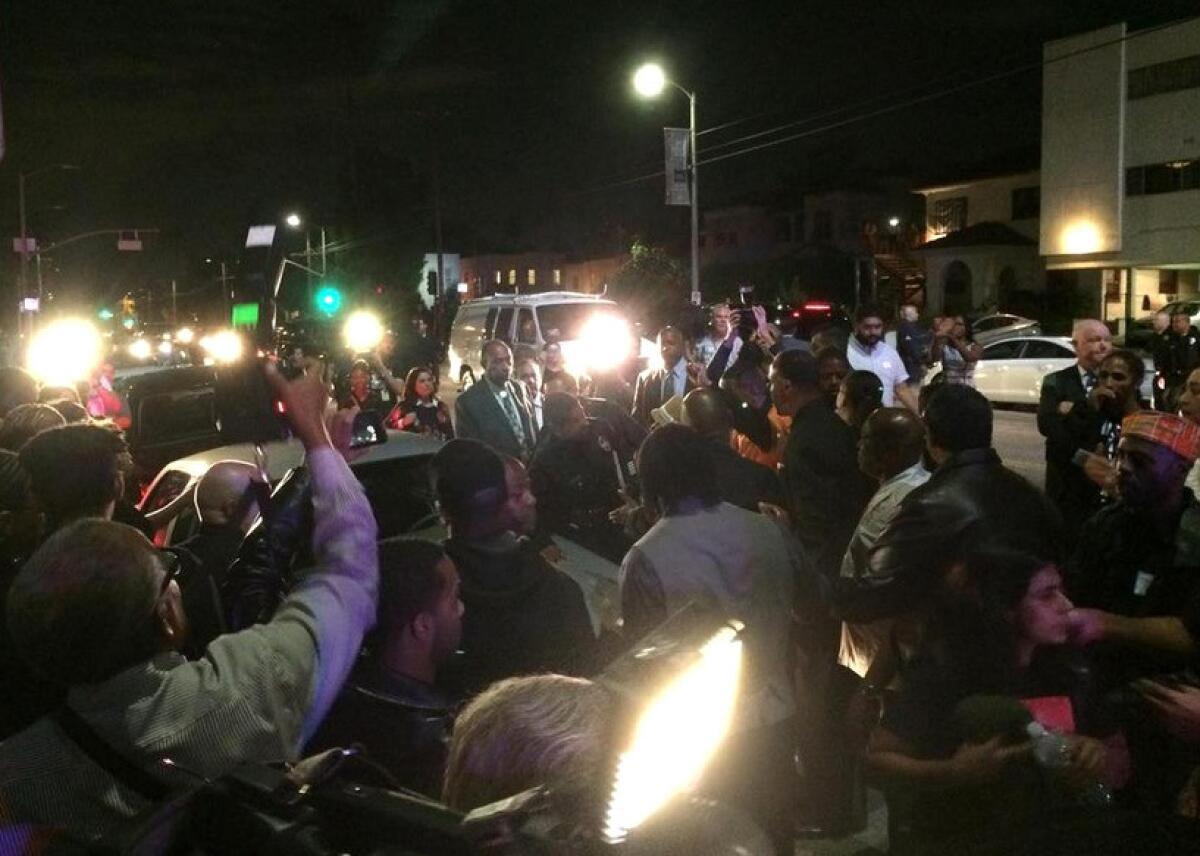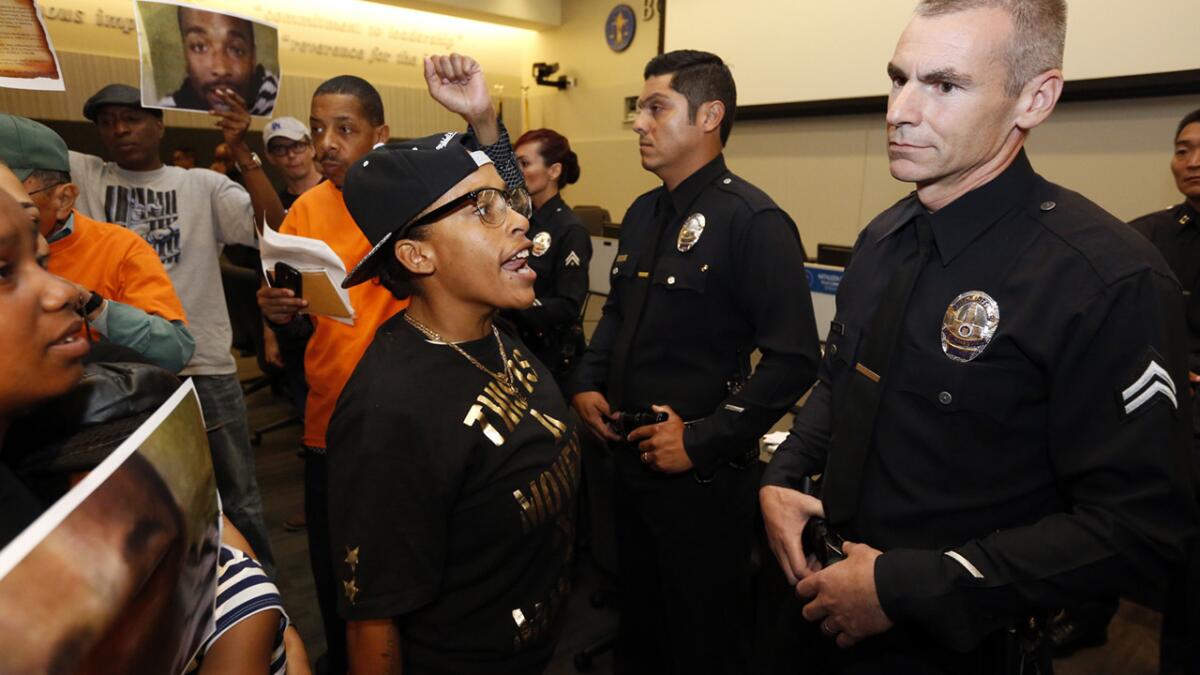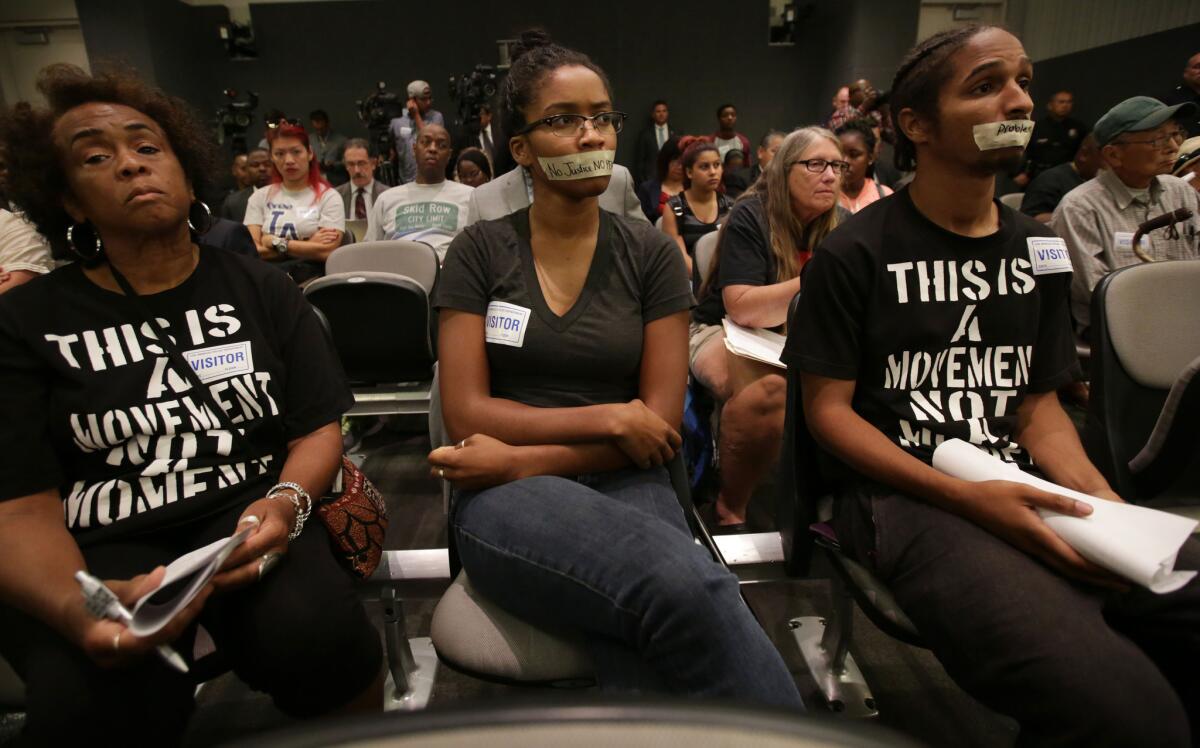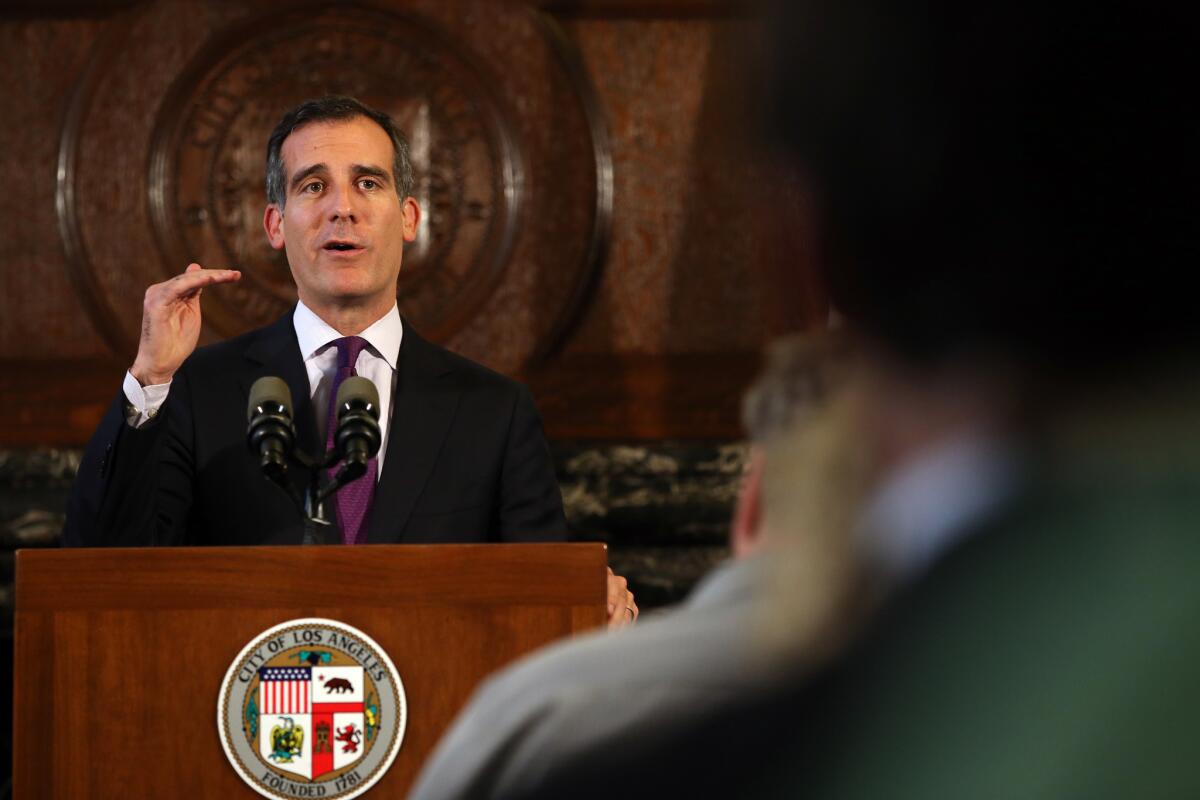How Black Lives Matter became a thorn in the side of L.A. leaders

Black Lives Matter protesters swarm L.A. Mayor Eric Garcetti’s car after a community meeting was cut short Monday night at Holman United Methodist Church in South Los Angeles.
Over the last year, the Black Lives Matter movement have emerged as a vocal and controversial force in Los Angeles police politics.
The group took part in several large protest marches, some of which blocked traffic and in a few cases had demonstrators bringing freeway traffic to a standstill. Those mass protests have faded. In January, the movement camped peacefully outside Los Angeles police headquarters downtown, calling their protest Occupy LAPD. They were evicted, and two activists were arrested as they tried to take a letter to LAPD Chief Charlie Beck.
But more recently, the group has focused more attention specifically on Mayor Eric Garcetti and the Los Angeles Police Commission.
Clashes at L.A. Police Commission
Since this summer, a series of Police Commission meetings have been disrupted by activists, including those affiliated with Black Lives Matter, who have protested recent police shootings in L.A. and across the country.
In response, the commission drafted proposed rules stipulating that people who made "repetitious, personal, impertinent or profane remarks" at the weekly Police Commission meetings could be ordered to leave and ultimately removed by police.
The rules were designed to "establish an appropriate level of safety, decorum and efficiency" during the meetings and avoid "delay, distraction and disruption," according to the document initially put before the commission.

Protesters chant during an L.A. Police Commission meeting on Tuesday. The meeting, held on the first anniversary of the shooting death of South L.A. resident Ezell Ford, had to be halted briefly.
Protesters chant during an L.A. Police Commission meeting on Aug. 11, 2014. The meeting, held on the first anniversary of the shooting death of South L.A. resident Ezell Ford, had to be halted briefly. (Mark Boster / Los Angeles Times)
Rules prompt backlash
But the commission postponed action on the rules amid criticism from civil libertarians and others.
In a letter sent to the five police commissioners, ACLU staff attorney Catherine Wagner said the language of the proposed rules "leaves open the possibility it may be construed in ways inconsistent with the protections for free speech in both the United States and California constitutions."
The local chapter of Black Lives Matter called the proposed rules "one of the most blatant efforts to silent an engaged public and a direct attack on their 1st Amendment rights and on Black Lives Matter as a whole."
The commission later approved a revised set of rules. Since then, people who have disrupted the meetings have been escorted out of the room.

Attendees participate in a silent protest at the weekly Los Angeles Board of Police Commissioners meeting on Sept. 30.
Paula Minor, Nia-Amina Minor and Terue Williams participate in a silent protest at the weekly Los Angeles Board of Police Commissioners meeting on Sept. 30, 2015. (Irfan Khan / Los Angeles Times
Garcetti's relationship with Black Lives Matter
That relationship hit a low point in June, when Garcetti flew to Washington, D.C., on the eve of the Police Commission's ruling on whether LAPD officers were justified in the fatal shooting last summer of Ezell Ford, an unarmed, mentally ill black man.
Garcetti was caught on videotape trying to avoid Black Lives Matter protesters camped outside the mayoral residence in Windsor Square by leaving through the back door. When the protesters discovered that and blocked his car, he told them he was flying to the nation's capital to secure federal funding for homelessness and community policing initiatives.
It later emerged that the trip was actually scheduled so Garcetti could attend a fundraiser for his 2017 reelection campaign at the home of a prominent Democratic Party operative.

Los Angeles Mayor
Los Angeles Mayor Eric Garcetti discusses the L.A. Police Commission's ruling on the Ezell Ford case at a news conference on June 9, 2015. (Rick Loomis / Los Angeles Times)
Garcetti's forum descends into chaos
Garcetti held a community forum Monday at Holman United Methodist Church, attended by several hundred, that was quickly overtaken by about 50 protesters from organizations including Black Lives Matter. As Garcetti spoke to a full house in the church's cavernous sanctuary hall, the demonstrators stood and turned their backs to him.
Toward the end of the hourlong session Garcetti, ringed by police officers, struggled to reach his car as he was swarmed by a crowd of chanting activists — and once inside the vehicle, he was forced to wait amid blaring sirens until the crowd was dispersed by the LAPD.
In a statement released late Monday, Garcetti said he was disappointed by the meeting's outcome.
“Tonight, we had hundreds of South L.A. residents attend a community meeting — leaders, business owners, mothers and children, who took time out of their evening to discuss the critical issues that matter most to all of us,” he said. “I am disappointed that our conversation was cut short when there is so much work for us to do together to make our neighborhoods stronger and safer. I believe in our city and my commitment to our shared concerns continues, stronger than ever.”
Sign up for Essential California
The most important California stories and recommendations in your inbox every morning.
You may occasionally receive promotional content from the Los Angeles Times.








